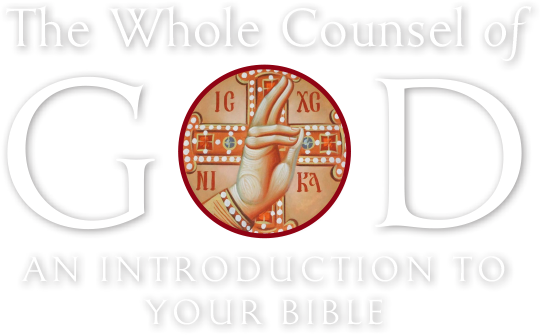
The topic of the post would seem to be an easy question. In Matthew 5:17, Christ states that he has not come to abolish the Law or the Prophets, but to fulfil them. Once this text has been quoted and the box has been checked, however, when the way in which the Law is interpreted, treated, and applied particularly in Protestant communions, the practical reality of this verse becomes more cloudy. If what is meant by ‘fulfilled’ is ‘taken care of’ or ‘done away with’ on a practical level, if it effectively means ‘can be safely ignored’, then saying ‘fulfilled not abolished’ is a distinction without a difference. Matthew 5:18-19 do a great deal to clarify what precisely Christ means in verse 17. He clearly states that not the tiniest letter, or piece of a letter will pass from the Law until the end of this age. He then proceeds to state that greatness in the Kingdom of Heaven will be based on doing and teaching the commandments of the Law, even down to the very least of them. Taken in context, whatever we will say that ‘fulfil’ means, it must include all of the commandments being done and taught for the remainder of this present age in our world.
Since John Calvin made this distinction, it has become a commonplace in Protestant theology, even of the non-Reformed variety, to divide the Law into three categories, the civil, the ceremonial, and the moral. Civil laws are those commandments that deal with the administration of the government and criminal justice systems of the nation of Israel in the Old Testament. Ceremonial laws are those commandments dealing with the sacrificial system and other parts of Israelite worship, as well as the laws concerning cleanness and uncleanness. Moral laws are then those commandments which deal with moral conduct. Christ is then said to have fulfilled the whole Law, and the result of this fulfillment is that the civil and ceremonial commandments no longer apply to Christians. The moral commandments, on the other hand, continue to apply to Christians as they always have to all human beings.
The problems with this approach are several. First and most obviously, in Matthew 5 Christ makes it quite clear that every one of the commandments should be done and taught until the end of this age. If he had meant ‘until the Church begins’ there would be no reason for these words to be recorded in St. Matthew’s Gospel, as by the time of its writing, the Church was in existence. St. Matthew records these words of Christ and directs them to the Church. Additionally, while civil, ceremonial, and moral are logical categories that can be used to categorize and discuss the various commandments perhaps helpfully, this distinction is nowhere found in the scriptures, either in the Law itself, or in the New Testament. There is no distinction made within the ten commandments between the first four and the final six. Idolatry is treated everywhere in scripture as a moral offense, not a ceremonial one. The statements of moral offense in the Law are almost always accompanied by civil penalties that result from the violation of these commandments, and/or ceremonial prescriptions for expunging the offense. A typical commandment format might be, “If a man commits murder, he shall be put to death unless he offer a ram and a young lamb as a sin offering.” A single commandment may include all three of these categorizations, and Christ clearly did not teach that one third of these commandments ought be done and taught. Finally, the word ‘fulfil’ is here used in an equivocal way, meaning different things in regard to each of the three categories, even though it is being used in one single context. Christ is seen to have fulfilled the vast majority of the ceremonial law, centering on the sacrificial system, through his sacrifice having taken the place of the many animal sacrifices, and so all of those commandments no longer apply. The rest of the ceremonial law, such as the food laws, Christ fulfilled by keeping those commandments in his own life, and therefore they are said to no longer apply. The moral commandments, on the other hand, Christ fulfilled in precisely the same way, by keeping them in his own life, but they are said to still apply in full force. Christ is said to have fulfilled the civil commandments by never being subject to their penalties, being without sin, and this too, in some unclear way, renders them all not applicable.
The reason that this now traditional Protestant view falls apart on close inspection is that it is a theological distinction made, and then applied to scripture which is based not on the teaching of scripture itself, but on an existing theological tradition and practice. In the 16th century, Christian civil governments no longer utilized the commandments of scripture as the basis for civil law, Christians no longer followed the food laws, and Christian worship looked very different from that commanded in the Old Testament (and was, within Protestantism, going to move even farther from the Old Testament model), but at least in broad strokes the Christian moral compass still relied heavily on the Old Testament. This view of the threefold division of the Law was then created to explain and justify the fact that a large number of commandments were, and could be, ignored. It is a theological distinction invented to justify a practice, rather than an approach coming from the scriptures to elaborate what belief and practice ought to be.
On the contrary, in keeping with Christ’s statement in Matthew 5, every commandment of the Law is done, taught, and continues to live in the life of the Orthodox Church. All of these commandments, and each one in particular, continues to be relevant and applicable, in a state fulfilled by Jesus Christ. Fulfillment is here seen as a lens through which the commandments are read, rather than a veil, as now, knowing Christ, we can understand the real meaning, force, and life-giving power of the commandments. To give an example of this sort of fulfillment other than a commandment, we need only look to the promise to Abraham that God would give to he and his posterity the land of Canaan. This promise was made in Genesis 15:18-21 to Abraham and later confirmed to his descendants. We see in Exodus and following that God keeps his promise by delivering Abraham’s descendants from slavery in Egypt, bringing them to the land, and giving it to them. By the end of the book of Joshua, it can be said, “Thus the Lord gave to Israel all the land that he swore to give to their fathers. And they took possession of it, and they settled there. And the Lord gave them rest on every side just as he had sworn to their fathers. Not one of all their enemies had withstood them, for the Lord had given all their enemies into their hands. Not one word of all the good promises that the Lord had made to the house of Israel had failed; all came to pass” (Josh 21:43-45). Though all of these promises are seen as having had a literal fulfillment and completion in the Old Testament, these promises are seen by the writers of the New Testament to still be living and active promises in the lives of Christians. The Epistle to the Hebrews states that the real promise to Abraham was of a heavenly city and promised land (Heb 11:10,16). St. Paul frequently describes the Christian life in terms of the wilderness wanderings of Israel on the way to that land, where there will be rest. This is not presented by the New Testament as an allegorical or metaphorical use of these Old Testament promises, but as the reality of those promises, now known through the revelation of Jesus Christ.
The next several postings here will deal in more detail with the way in which this understanding of fulfilment applies to all of the commandments of the Law through discussing significant New Testament texts that reveal the apostolic understanding of the continued life of the commandments in the lives of Christians. This will begin, in the next posting, with a discussion of Acts 15.

I look forward to your further elaboration of how the commandments maintain their currency until the end, and your criticism of the three fold division of commandments. The Fathers always understood the commandments in terms of the end, who is Christ, so I suspect that the answer lies here. Surely the answer must lie in what the law points to in the light of Christ. For example, the Sabbath must be kept by Christians, as ceasing from sin, it has been fulfilled in Christ, but remains in effect as understood through the lens of Scripture which is Christ.
Hi Father DeYoung.
Would you please explain the distinction you made between Protestantism and Reformed Protestantism. Thank you.
Protestantism is a broad category that includes all Christian groups which trace their origin back to the Protestant Reformation in the 16th century. ‘Reformed’ in this case refers to one particular groups of communities within Protestantism that generally trace their origin back to John Calvin and his immediate successors and generally hold to some form of Calvinism. This would primarily be Presbyterian and Dutch Reformed groups in the modern world.